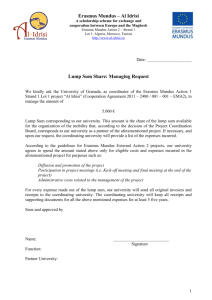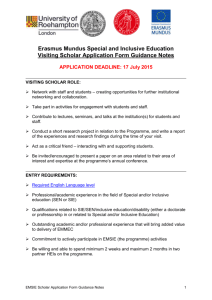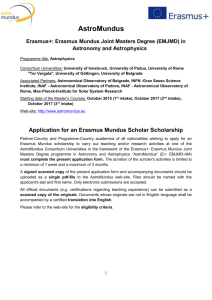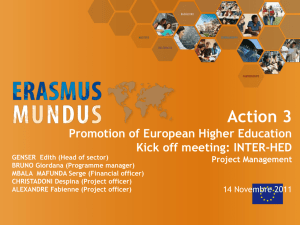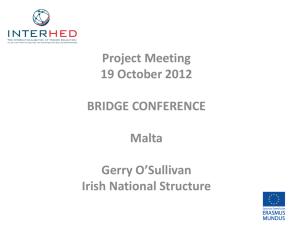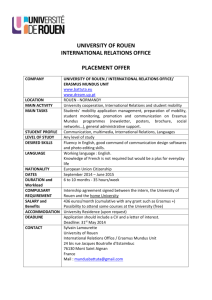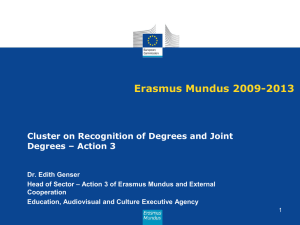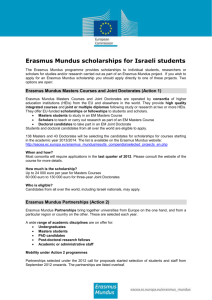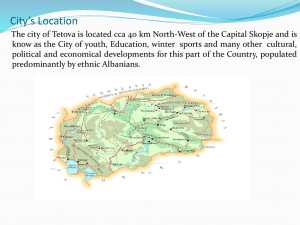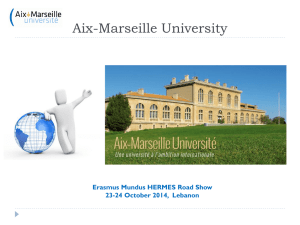Introduction: Erasmus Mundus and its impact on brain drain/ gain
advertisement
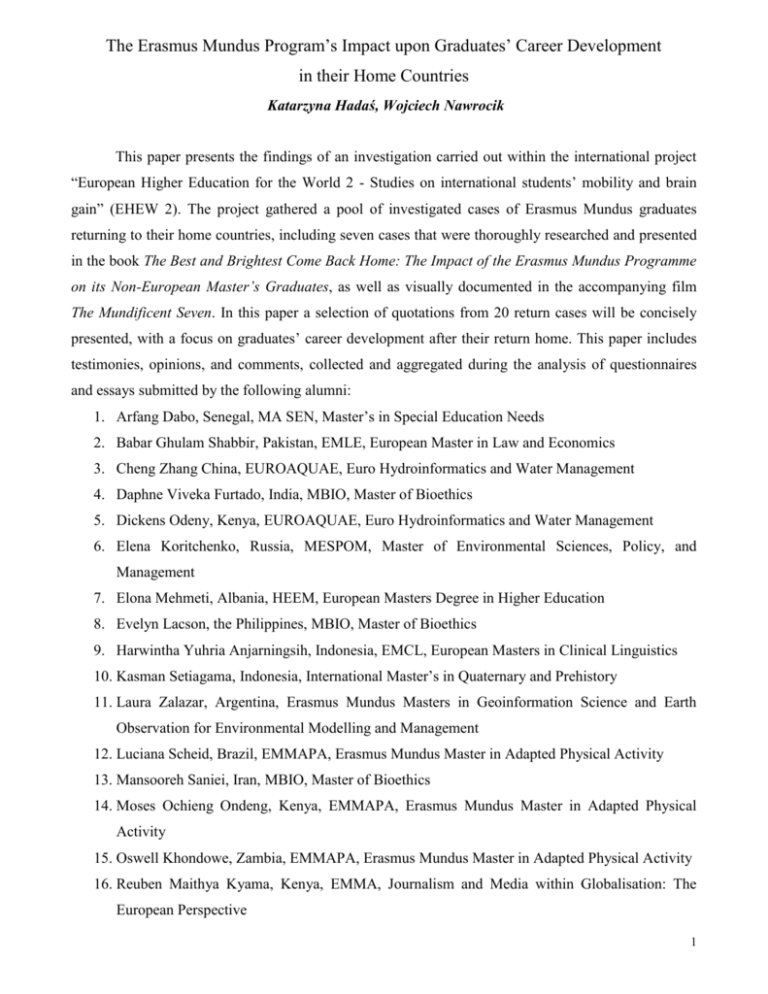
The Erasmus Mundus Program’s Impact upon Graduates’ Career Development in their Home Countries Katarzyna Hadaś, Wojciech Nawrocik This paper presents the findings of an investigation carried out within the international project “European Higher Education for the World 2 - Studies on international students’ mobility and brain gain” (EHEW 2). The project gathered a pool of investigated cases of Erasmus Mundus graduates returning to their home countries, including seven cases that were thoroughly researched and presented in the book The Best and Brightest Come Back Home: The Impact of the Erasmus Mundus Programme on its Non-European Master’s Graduates, as well as visually documented in the accompanying film The Mundificent Seven. In this paper a selection of quotations from 20 return cases will be concisely presented, with a focus on graduates’ career development after their return home. This paper includes testimonies, opinions, and comments, collected and aggregated during the analysis of questionnaires and essays submitted by the following alumni: 1. Arfang Dabo, Senegal, MA SEN, Master’s in Special Education Needs 2. Babar Ghulam Shabbir, Pakistan, EMLE, European Master in Law and Economics 3. Cheng Zhang China, EUROAQUAE, Euro Hydroinformatics and Water Management 4. Daphne Viveka Furtado, India, MBIO, Master of Bioethics 5. Dickens Odeny, Kenya, EUROAQUAE, Euro Hydroinformatics and Water Management 6. Elena Koritchenko, Russia, MESPOM, Master of Environmental Sciences, Policy, and Management 7. Elona Mehmeti, Albania, HEEM, European Masters Degree in Higher Education 8. Evelyn Lacson, the Philippines, MBIO, Master of Bioethics 9. Harwintha Yuhria Anjarningsih, Indonesia, EMCL, European Masters in Clinical Linguistics 10. Kasman Setiagama, Indonesia, International Master’s in Quaternary and Prehistory 11. Laura Zalazar, Argentina, Erasmus Mundus Masters in Geoinformation Science and Earth Observation for Environmental Modelling and Management 12. Luciana Scheid, Brazil, EMMAPA, Erasmus Mundus Master in Adapted Physical Activity 13. Mansooreh Saniei, Iran, MBIO, Master of Bioethics 14. Moses Ochieng Ondeng, Kenya, EMMAPA, Erasmus Mundus Master in Adapted Physical Activity 15. Oswell Khondowe, Zambia, EMMAPA, Erasmus Mundus Master in Adapted Physical Activity 16. Reuben Maithya Kyama, Kenya, EMMA, Journalism and Media within Globalisation: The European Perspective 1 17. Garcia Lopez Reyes, Mexico, MEEES, Masters in Earthquake Engineering and Engineering Seismology 18. Sridevi Seetharam, India, MBIO, Master of Bioethics 19. Tahia Devisscher, Bolivia, MESPOM, Master of Environmental Sciences, Policy, and Management 20. Vivek Kumar Dhaka, India, MEEES, Masters in Earthquake Engineering and Engineering Seismology An essay contest entitled “Returning to My Home Country. My Post-Erasmus Mundus Story” was announced in 2007. From the 32 Erasmus Mundus graduates who answered the call for contributions, 28 filled in introductory questionnaires after exchanging of emails with project staff, and ultimately 18 of them wrote essays. The objective of the call and the subsequent research was to profile the number of EM Alumni who have returned to their home countries as a means of showing to a wide European and global audience real life examples of success stories in the struggle against global brain drain. The cases presented here are those of graduates of Erasmus Mundus courses from non-European countries considered economically less developed, developing, or newly industrialized. At the time of research they were working in their home countries in sectors related to the specializations of the Erasmus Mundus Master Course they had completed. These returnees were asked to comment on the role of transfer of the knowledge and skills gained in Europe to the professional practice and social development in their home country. Among the chosen 20 cases there are engineers, medical doctors, administration workers from universities and NGOs, scientists, university lecturers, an IT specialist and freelancers such as consultants in various specialties, a journalist, and a lawyer. They represent 12 Erasmus Mundus Masters courses (EMMCs) and 15 countries. The researched cases concern individuals who come from countries of five continents, including both large and emerging economies such as BRIC (Brazil, Russia, India, China), as well as those smaller and poorer countries with the highest brain drain indexes - such as Bolivia, Senegal, the Philippines, and Albania. The graduates’ testimonies document the variety of their motives for studying in the Erasmus Mundus programme, the diversity of their experiences both in Europe and on returning home, and the range of different paths that their personal and professional development have subsequently taken. They show the potential of the Mundus programme to have a positive impact on poorer countries through the work of its alumni. In some cases, the graduate’s return resulted in major developments in their field of expertise in their country, while those of others resulted in smaller improvements, or just in an increased level of professionalism at their institutions. Regardless of their magnitude, these developments were all possible thanks to the transfer of knowledge and skills from Europe. 2 The EM alumni essays, as well as the statements and responses in the questionnaires, revealed three main directions of programme impact: - cultural and intellectual impact - Mundus graduates have got an international exposure, with the EM programme being their “window to the world”, they benefited culturally, intellectually, and linguistically in the rich educational and cultural environment of EU countries,, - educational impact - they have became acquainted with international academia, have gotten to know other university systems and different academic cultures, have benefited from high quality and up-todate research, modern approaches to the teaching-learning processes, the evaluation and quality assurance culture, access to literature resources in vast libraries, and access to high-tech laboratories. - professional and developmental impact - the alumni, having being trained at EU Higher Educational Institutions (HEIs), and having had access to broad, up-to-date sources of knowledge and technology, have benefited professionally, which has increased their capacities to continue to advance their education, research work, and professional activities at home, thus contributing to the development of their home countries. The EM graduates’ testimonies concerning their career development are commented on and have been divided into five groups: 1) advances in professionalism (of alumni and their institutions), 2) promotion at work or getting a better job, including positions offered as a continuation or consequence of the internship organized by EMMCs , 3) increase in responsibilities and functions, including transfer of knowledge, 4) challenging professional tasks, and 5) opportunities to work pro bono publico. 1. Advances in professionalism The analysed cases show that training in the EU has contributed to the development of the EM graduates’ professionalism and increased the quality of human resources in their home institutions. The expertise, know-how, and generic, communication, and language skills obtained, along with the increased professional and overall confidence, all contributed to the development of human resources in many institutions of the public and private sectors. The interaction which the third-country professionals experienced with their European counterparts in both academic and social settings helped to develop cross-boundary understanding. In the wider perspective, this will facilitate future cooperation in their sectors and the mutual enrichment of their societies. Below we present some respective examples. Laura (Laura Zalazar, F, 37, Erasmus Mundus Masters in Geoinformation Science and Earth Observation for Environmental Modelling and Management, Argentina1) is a Geographic Information System (GIS) specialist from Mendoza, Argentina. Geographic Information Systems are 1 On mentioning an EM graduates for the first time, we give his or her name, sex, age at the time of the contest, EM Masters course completed, and country of origin 3 used for capturing, managing, analysing, and displaying all forms of geographically referenced information. Before studying in Europe she worked at the Institute of Rural Development, a semigovernmental organization, carrying out analyses and providing practical recommendations which supported the agricultural development of the Mendoza region. The same job was waiting for her on completion of her studies, where she could put into practice her enhanced professional skills: “When I returned my first task was to continue working with land uses in agricultural areas through satellite image processing. I was working in this topic before the specialization in Europe but after coming back I could apply some new skills gained in Europe and understand my job from a theoretical point of view. The course helped me in improving some skills I already had and gained new ones. It particularly helped me in the understanding of geographical information management and ability to apply GIS, remote sensing and related tools to solve problems of my own region in a global context”. In case of Sridevi from India and Dickens from Kenya, the Mundus studies led to increased human and learning resources: educated academic staff and researchers with enhanced qualifications (in terms of professional qualities, personal development, linguistic, and generic skills) that enriched the institutional capacity of their home institutions. They transmitted their gained knowledge, skills, collected literature resources, etc., in order to actively contribute to better research quality, broadening, updating, and enriching the range and content of teaching, bringing various innovations, modern methods and approaches to governance. Sridevi (Sridevi Seetharam, F, 38, MBIO, Master of Bioethics, India) started working as a volunteer with an Iranian nongovernmental organisation 18 years ago, and has been an employee there for 10 years as a medical doctor and a consultant pathologist. She also teaches, she comments on the widening perspectives and change of approach towards her students: “The course curriculum as well as my interactions with the Europeans and my colleagues has widened my world view and also my understanding of different religions. It has stimulated me to look more closely at my own roots and religion. The respectful attitude of the faculty towards students has influenced my own interaction with my peers and my students of paramedical training. The respect and social equity enjoyed by women was particularly striking. While I have been enriched by the European experience, I have also realised how much my own culture and religion has to offer to cultures beyond India”. Significant research development was reported by Dickens (Dickens Odeny, M, 29, Joint Master in Water and Coastal Management, Kenya), who has become a research scientist at the National Museum of Kenya. His main work after return has been “to carry out field and desk research (surveys) on wetlands and marine biodiversity, develop research/project proposals, provide consultancy to the public on above areas, train students on attachments and local communities on biodiversity conservation, and organize and manage events (workshops and initiatives)”. Elona (Elona Mehmeti, 27, F, HEEM, European Masters Degree in Higher 4 Education, Albania), who was working in the curriculum development office of a private university in Albania, and was also a member of an internal evaluation group involved in the process of receiving accreditation for her institution, reports that “I find myself now after two years knowing more about new processes and reforms going on in higher education in Europe. This experience gave me more information also for my daily work. Knowing different cultures and different schools of thought helps me in being more flexible in designing and developing the curriculum”. Tahia (Tahia Devisscher, 27, F, MESPOM, Master of Environmental Sciences, Policy, and Management, Bolivia) after her return to Bolivia was offered consultancy work as a researcher and analyst for the Human Development Report 2008. At that time she was researching controversial topics for the report: biofuel development in Bolivia, Latin America, and globally; contamination from mining in Bolivia; and socioeconomic and environmental effects due to hydro dam projects and development programs in the Amazonian rainforest of Bolivia. “I gained the skills to work and interact with multicultural and multidisciplinary teams. During our program, for instance, we had to work in teams composed by students coming from different countries and with diverse backgrounds. The experience was very rich and it gave us excellent skills to work at an international level in jobs that combine multiple disciplines and gave me the opportunity to better understand global dynamics” which is valuable for a person working for UNDP. One member of the analysed group is a medical doctor who at the age of 54, after 23 years of very successful medical practice, went to Europe to study a new discipline. Evelyn (Evelyn Lacson, F, 55, MBIO, Master of Bioethics, the Philippines) had been a practising obstetrician-gynaecologist for 23 years before she went to Europe to study bioethics. She works at a hospital in Bacolod City, at the local university, and also runs her own private practice. Evelyn reorganized the university ethics board which she now heads, and disseminated the concept of bioethics among the medical practitioners. She also teaches bioethics and her competence for this activity increased thanks to the EM masters studies: “My EM Masters degree has enriched my career by being able to put substance to the materials I teach. It has given me a wider perspective which I can share to my students and colleagues regarding current ethical issues from a secular point of view. It has encouraged me get more involved in research regarding ethical issues. It has exposed me and made me understand Western philosophical thinking, sociology and current public health issues which I now use and will use for helping set guidelines and policies”. Completion of a degree in law and economics in Europe has enabled Babar (Babar Ghulam Shabbir, M, 30, EMLE, European Master in Law and Economics, Pakistan) to understand and analyze the general issues pertaining to the civil and common law he practices back in Karachi: “I learned many aspects such as competitive market structure, regulatory systems, tort liability, 5 transaction costs, doctrine of efficiency and equitable, environmental protection, property rights of common issues, bankruptcy procedures and insolvency of persons/companies of different European countries, emerging in their market based economy. I have not only gained knowledge about different subjects, but also learned new ways of conducting research and developed my leadership qualities through class discussion, paper presentation, paper writing on different issues. That experience was excellent and it gave me lot of confidence and enabled my intellectual capabilities” The generic skills gained during studies, more or less advanced, but indirectly enhancing professional capacities, were reported by two EM alumni from Africa. Moses (Moses Ochieng Ondeng, EMMAPA, Erasmus Mundus Master in Adapted Physical Activity, Kenya) is a senior sports and games officer in the sports and games department of Jomo Kenyatta University of Agriculture and Technology in Kenya. “My research and conference paper presentation skills which I got during the training in Europe”, says Moses, “have really helped and I have been invited to make a poster presentation during the 2007 sea games & ASEAN paragames scientific congress in Thailand. I am also involved in the training and coaching of a sitting volleyball team, and in relation to that we are organising a seminar sitting volleyball coaches from the whole country”. Arfang (Arfang Dabo, M, 42, MA SEN, Master’s in Special Education Needs, Senegal) is an officer at the Ministry of Education, who before his studies in Europe lacked more advanced computer literacy: “The field in which I have gained the most is the use of the computer. My computer skills have improved a lot. Now I can do online research, send documents and get feedback. I can even attend/chair online discussions and video conferencing”. 2. Promotion at work Many EM alumni reported that they had been promoted at their pre-Mundus workplace, or had gotten a better job elsewhere, while some were offered positions that were continuations of or consequences of the internship organized by EMMCs. Among those who returned to work at the same institution is Harwintha (Harwintha Yuhria Anjarningsih, F, 26, European Masters in Clinical Linguistics, Indonesia). She worked as a lecturer in the English Department in the Faculty of Humanities at the University of Indonesia in Depok - the best university in the country. She taught English skills to bachelor’s degree and diploma students, but her dream was to be a researcher: “Before I even started my study in the European Masters in Clinical Linguistics, I had always wanted to be a researcher. Doing research and applying the results to assist the people who are in need of them are what I wanted to do”. When asked how she had benefited from the programme, Harwintha first mentioned her improved professional status. After her return from Europe, she became a full lecturer eligible to teach courses with linguistic content (phonetics and phonology) as a part of the bachelor 6 program at the University, while before she was only teaching English as a foreign language: “The degree has helped me increase my status; it has changed from junior lecturer to full lecturer. This means I can participate more in academic activities such as conferences and do not stay an English instructor forever. Furthermore, the degree will help me achieve my dream to become a languagedisorder researcher in Indonesia. I use the knowledge and skills gained in Europe to choose the latest development in linguistics and present it to my students, choose relevant study materials for students of certain levels, assist students who want to conduct research in linguistics, and inform issues of language disorders to general public”. Recently, thanks to her excellent performance in the EMCL, Harwintha has been offered a PhD fellowship by a professor from the Netherlands who is considered to be the greatest expert in the field of aphasiology. This will let her to continue her research into dyslexia and autism. There is another Indonesian EM alumnus who has been offered doctoral studies in Europe Kasman (Kasman Setiagama, M, 34, International Master’s in Quaternary and Prehistory, Indonesia). Kasman’s case is different from that of Harwintha, as he is working for his country from abroad. Kasman is assistant to the Ambassador of the Indonesian Delegation to UNESCO and a PhD student at Muséum Nationale d’Histoire Naturelle (MNHN) in Paris. This is how he describes being a link between Indonesia and Europe, and merging administrative and scientific duties: “Soon, after the examination of my thesis in front of the international jury on the 16th of June 2007 in Muséum Nationale d’Histoire Naturelle (France), I had an opportunity to enroll in the office of the Permanent Delegation of the Republic of Indonesia to UNESCO. Since then, I have been an assistant to the Ambassador of the Indonesian Delegation to UNESCO, and I also have been a student in the doctoral degree at MNHN. There are contrasts but I found the interface for myself. From the substantive matters as well as administrative and secretariat matters in my office, I have the opportunity to learn what happened with a big dream like UNESCO: a dynamic of multilateral cooperation, substantive matters in cultural sector and world heritage management, having the opportunity to meet with the decision makers from my country in the office (they are the bureaucrats and the legislators) and learn to use different working languages and office tools (informatics, archiving). For my studies, my working group in MNHN has understood that my days were busy with administrative matters but by all means we were working together for our scientific matters and network. As a student who is working for the diplomatic representatives, I’m still doing my research, following the scientific meetings and conferences as well as making some contributions to my scientific network; Human Origins Patrimony in Southeast Asia. The HOPsea network provides the international collaboration to human patrimony studies in Southeast Asia. The scientific exchange between European and Southeast Asian partners gives the opportunity to find and work with international colleges, share everything for the scientific matters, and expand my networking”. 7 Moses says with pride, “I have been given more managerial duties and responsibilities. Indeed, I am the deputy director of the department. The Sports Commissioner in the country from the ministry of Gender and Sports also appointed me officially to be in charge of a team of sitting volleyball which formed earlier on and ensure the spread of the game to other parts of the country. I was given these responsibilities and duties as a consequence of the APA master course experience and qualification”. Moses is in charge of office administration, matters pertaining to policies, and staff establishment in the department at his university. Although some the respondents received significant promotions at work, only a few reported that this included a significant rise in earnings. Vivek (Vivek Kumar Dhaka, M, 39, MEEES, Masters in Earthquake Engineering and Engineering Seismology, India) talks sincerely about his increased salary, a very important factor in success and career development. He is presently working as senior project manager in the Delhi office of AF Colenco Limited - a Swiss-based multinational corporation. His career development after Mundus studies improved greatly both in terms of job satisfaction and comfort, and remuneration: “After doing my studies I did have some opportunities for working in Europe, but since I had my family back in India I was more feeling comfortable to be there in my own country so I decided to move back to India and continue practicing as an engineer over here. After my studies in Europe there was a lot of difference, a lot of personal changes in me and a lot of good opportunities were waiting for me over here in India. Before I left for my studies in 2005 I was earning salary worth 60,000 Indian rupees, that is about 1,000 Euro a month, but when I came back in 2006, my salary was two times as big the one which I was earning earlier, and presently in 2009 it has increased to more than three times the amount. This is a reward for that part of knowledge I gained from Europe”. Getting a job position as a continuation or consequence of the internship organized by EMMCs in Europe was reported by Cheng from China and Luca from Brazil. Practicing computational modelling of rivers and seas on an internship changed the Chinese student (Cheng Zhang, M, 26, EUROAQUAE, China) from an intern to an employee at a branch of a French company in his home country: “My knowledge about computational modelling of river and sea, gained at EUROAQUAE helped me in my professional carrier. I work at a French Environment Consultancy Company in Shanghai as Hydraulic Modelling Engineer. I am working for environment protection projects (some are World Bank or Asian Development Bank loan projects) My current work is transferred from an internship in the company’s headquarter in France”. Luca (Luciana Scheid, F, 26, EMMAPA, Erasmus Mundus Master in Adapted Physical Activity, Brazil) dreamed about working for the Brazilian Paralympic Committee. While doing her Master’s thesis, she kept very good contact with a couple of teachers who were involved in the International Paralympic Committee. These contacts gave 8 her the chance to do an internship there, where she gained practice and experience in an international organisation. Luca spent three months during her internship in Bonn, Germany, working for the International Paralympic Committee: “And I thought also that this experience in international organization would be great for my curriculum, because when coming back to Brazil I would have this advantage over the other candidates. As an intern of the Marketing and Fundraising department, I worked for three months, learning as much as I could because another dream was forming - I wanted to return home and work for the Brazilian Paralympic Committee”. And indeed this addition to her CV gave her the advantage over other candidates, as they needed someone to work with marketing and international relations - skills provided by her experience during the internship,. Some EM alumni reported that they got a better job thanks to the EM diploma - this was an element in Dickens’, Elena’s, and Oswell’s testimonies. The EM diplomas, both jointly and multiply issued by prestigious European HEIs helped to convince their future employers about quality of their educational backgrounds. Dickens says, “The certificate I got after completion is eye-catching and has high weight due to the nature of the course (joint programme) and the quality of education in Europe. Thus, it made me have an advantage in the competition for a job in Kenya”. Elena (Elena Koritchenko, F, 24, MESPOM, Master of Environmental Sciences, Policy, and Management, Russia) works at COWIconsult International, Ltd. (Moscow). The company provides engineering, economic, and environmental solutions for EBRD loans for municipal services in the Russian regions. In Elena’s words, “I work as senior environmental expert and manage projects coordinating work of Russian and international experts and establishing common understanding on development issues. The EM degree helped significantly in my career. The key skills obtained during this course are: European approaches to cleaner production, institutional development, EU environmental legislation, international cooperation. Further, now I use professional terminology improved during my study. I got an opportunity to study in Sweden and have internship in Norway which are among the most environmentally advanced countries. Solid educational MESPOM background and a reputable diploma provided a perfect starting ground for my career back in Russia. I hope to develop it further and feel strong enough to improve life quality for my people, environment for our children, and international dialog on those issues, so that I can be always proud of my country. Oswell (Oswell Khondowe, M, 31, EMMAPA, Erasmus Mundus Master in Adapted Physical Activity, Zambia) works in the neighbouring Republic of South Africa, as the Interprofessional Practice Coordinator at the University of the Western Cape in Cape Town. “It has helped a great deal to open doors for better job offers. I have been able to use what I learnt in Europe for interventions in the communities where my students are placed. I have gained interest in sports and recreation as well as rehabilitation and I make use of the rich knowledge I gained whilst in Europe”. 9 As a result, he now coordinates an interdisciplinary programme which runs across three faculties including the Dentistry, Community and Health sciences and Natural Science faculties. 3. More responsibilities Receiving more tasks and extending one’s responsibilities and functions - including transferring knowledge to workmates or to other groups in society - is a cause for pride and excitement among EM grantees. Among them are the previously cited Babar and Evelyn. Babar, the Pakistani lawyer, reports that the “EMLE degree has made a difference in my standing in legal practice and also helped me to develop my career within short period of time. I have a quality education, confidence, and also developed my good personal relationships with future leaders. I returned back to Pakistan in October 2006 and joined as an Associate an International Legal Consultants Law firm in Karachi, Pakistan. I am the second one in the law firm, and have been given lot of responsibilities to appear on behalf of the law firm in High Courts, city courts, labour courts, service tribunals, authorities etc”. Evelyn, having returned to the Philippines with knowledge of bioethics, is promoting and introducing it to medical practices: “Being the first graduate of a Masters degree in Bioethics, I was given the task to establish a Research Ethics Evaluation Board for the medical school and affiliate hospitals ... As a Fellow of the professional Society, the Philippine Obstetrical and Gynaecological Society, I have been asked to teach and train others like me regarding clinical ethical decision making for accredited residency programs and consultant level. It is an exciting time for me. I have been given the chance to do pioneering work of introducing European Bioethics in this part of my country”. After return EM graduates play a role of “transmitting and multiplying” the educational benefits they have gained, sometimes in forms organised by the returnees together with their home institutions. Some of them play the role of promoters of cooperation between their sectors in Europe and in their home countries, transmitting European Union ideas and values. “I would like to share my story of bringing European approaches into Russian reality to develop national environmental management to the best world standards”, says Elena at the start of her testimony, “The story became possible thanks to participation in Erasmus Mundus course on Environmental Science, Policy, and Management (MESPOM) which opened up ways to participation on large projects of high significance for society and environment in different regions of Russia and CIS countries”. The task of transmitting advanced expertise and new ideas to others has also been enthusiastically accepted by Laura from Argentina and Arfang from Senegal. Laura’s team is developing “Ecoatlas”, a unique program in Argentina with no equivalent in any other region, and she has been engaged in work in other provinces, by leading workshops on rolling out the program across the country; the program was thus disseminated and implemented in other regions. As she says, “My 10 contribution is related mainly with the transfer of knowledge and experience gained abroad. I was involved, together with a colleague, in organizing three courses. The topics of the courses were introductory and advance remote sensing with free software for image processing. There was also an advanced GIS course, where we trained in October 2007, 15 persons in remote sensing and GIS, who will be in charge of the implementation of the project in Santa Cruz. Arfang disseminates and introduces methodologies and approaches learned during his Master’s in Special Education Needs. He works for the Ministry of Education of Senegal as the assistant to the Minister’s English Language Teaching Advisor. His main job consists of coordinating English language teaching in secondary education and organising teacher development events: “Before we had been organising teacher improvement events without really evaluating them. That is a practice that I am helping to change. We are becoming more reflective practitioners. And our partners are compelled to follow. I am also raising awareness about special needs and inclusion among, not only the teachers of English, with whom I specially work, but also among the Ministry officials and other collaborators. I also teach in the in-service training events we organise. I have tried the methodologies and approaches that were used in the delivery of the courses and they have proved very helpful (Arfang Dabo, M, 42, MA SEN, Master’s in Special Education Needs, Senegal) Harwintha transmits to her students the pragmatic view that practicing education and training for jobs can be a way to well-being. She noticed a niche for private practices that is not yet filled in Indonesia: “Due to my studies in Europe, I become aware that linguistics can be very down to earth, i.e., used in therapies to help children and adults with language disorders to improve their lives. This awareness of mine has helped me inform students that linguistics is not an abstract discipline that only consists of theories. In addition to that, I have also informed my students that being an academician specializing in neuro- and psycholinguistics does not mean being poor because besides teaching and doing research, one can also do practical work such as becoming a consultant for schools which want to accommodate the needs of students with language disorders such as dyslexia. This is very important because in Indonesia linguistics is still viewed as a discipline that does not give financial benefits for its experts, as opposed to computer science and technical engineering”. The EM students were subjected to education and experiences that acquainted them with our political and economic systems, and helped them to understand our European point of view based on pluralism, humanism, individualism, freedom, solidarity, etc. Some Mundus alumni state that they have taken home the appreciation of these European values, of Europe’s history and culture, and also an appreciation of European products. Others act as links between institutions in their countries or regions and those of the EU. They can therefore be considered as “ambassadors” promoting closer, friendly relations with the European Union and its Member States. Garcias’ story can serve as an example of 11 this (Garcia Lopez Reyes, 29, M, MEEES, Masters in Earthquake Engineering and Engineering Seismology, Mexico). Interestingly, in the essay of this Mexican engineer we found our only example of entrepreneurship: “In co-participation with an old colleague we installed our own design/consultancy office. I was mainly involved with the structural design of buildings and housing. This labour was quite important due to the fact that new reclamation land areas are being developed in my city, and architectural designs are challenging the structural design. Even more, because Mexico is an earthquake prone country, I was able to apply the skills gained in the master in many projects. During the months I spent in my country, I could transfer some knowledge mainly in the area of structural and seismic design of structural concrete. The master clarified many misunderstandings I had in regard with structural and seismic design, and gave me new tools to fully understand the seismic events. As a matter of fact, I changed some design practices and induced to other engineers in our office to do the same. As an example, the use of a seismic reduction factors and its application in foundation design was thoroughly discussed with professors and colleagues, and we did change our design practice”. After this experience Garcia Lopez returned to Europe to undertake a PhD, but he plans to return to his country: “Thanks to the master I was easily admitted in a British university and got a scholarship from my government to continue my PhD. In such a way, I can continue my professional and personal development to get a lecturer position in a Mexican university. The skills developed in the master allow me to continue my research on the earthquake phenomena studying the strengthening of structures with new materials”. He has interesting comments resulting from his European and Mexican experience on mutual cooperation and on the brain drain issue: “I have now a different perspective of Mexican society. Comparisons between Europe and Mexico were, inevitably, a constant matter I had during all the months I spent overseas. As a Newly Industrialised Country, it is clear that Mexico is still lacking of information and high technology resources. However, at the same time it is evident that information and technology is nothing without a learned society; with an increasing number of researchers coming back to Mexico from overseas, it seems then that the nation is in the threshold of discovering its real potential. In this term and with an enormous interest in avoiding the so-called brain drain, the labour done by the European Union through the European Commission of Education and Culture is remarkable. Besides providing training to students and professionals, the EU also looks after them and promotes their repatriation. In my view, the EU is not seeking statistics of competitiveness or economic growth, and is instead a group of countries trying to have a better world to live in. I share this global vision and I am certain that the key factor to reduce economic and social inequity is cooperation between developed and less developed countries. The European perspective goes beyond and envisages that friendship and collaboration will produce fruitful results tending to reduce even more the gap between our nations”. 12 4. Challenging professional tasks Challenging professional tasks appeared in the lives of our respondents thanks to the recognition they received for their education and degrees. They were considered to be professionals who can face nonstandard tasks which require not only knowledge, but also open-mindness and broad horizons. “This position requires in-depth understanding of both vision and value sets, as well as nonstandard thinking”, writes Elena, “In the Russian office we focus on assistance to IFIs (such as EBRD, the World Bank etc.) with development programmes implementation, which are paying more and more attention to social and environmental impacts of their investments. My work is exciting and never boring because we act as a link between western companies and institutions and Russian businesses as well as authorities. The main idea of our work is to help Russian and CIS people, enterprises and whole regions to help themselves. We are only shaping and enhancing their interaction to achieve international standards. We are also involved in local capacity building and awareness raising programme on interaction with European financial institutions. Together with a team of COWI specialists in technology, economics, law, contracts management, we conducted a number of workshops on efficient project management approaches and strategies”. The respondents attributed intellectual and cultural gains to the time they spent in Europe, for example, the possibility of understanding different life styles and of further opening one’s mind. These features were developed during Mundus studies in Europe, as reported by, for example, Mansooreh (Mansooreh Saniei, F, 35, MAE, Master of Applied Ethics, Iran): “Surely, the EM program has a great role in my future academic life. My master program in Bioethics gave me an opportunity to study in three different Universities of Europe. I have been exposed to a variety of approaches to bioethical problems, within the European perspectives and also internationally. My class-fellows came from 15 different countries. So the discussions gave me valuable insights into the ground realities and ethical perspectives of different regions in the world. I feel that I am a world citizen”. “Upon my arrival back home, I knew what I wanted to do”, recollects Reuben from Kenya (Reuben Maithya Kyama, M, 32, EMMA, Journalism and Media within Globalisation: The European Perspective, Kenya). He intended to use the knowledge that he had accumulated in Europe to better inform his people and to inform the world about Africa: “I wanted to engage the international community and the public at large on issues afflicting the African continent. My first major assignment in Nairobi came up in April when I was commissioned by the New York Times to contribute on a joint article about the religious roots of the U.S. presidential candidate Senator Barack Obama. Another big assignment from the New York Times came in September. I was required to cover a story about the fight against dreadful malaria and the use of mosquito nets in endemic regions in Kenya”. 13 from Bolivia recollects how her interests and aspirations were channelled in a challenging job for UNDP: “I am interested in the potential of my country and other countries of the region to sustainable use their natural resources to achieve economic growth and reduce poverty. I would also like to integrate environmental considerations into development strategies and policies in order to break the vicious cycle between environmental degradation and poverty while enhancing environmental justice; I am also interested in working on designing and implementing programs that contribute to human development and environmental sustainability in the region. Applying to different organizations that could fulfil this professional objective, I have found a great opportunity with UNDP Bolivia working as consultant for the 2008 Human Development Report. This report, entitled ‘The other Frontier’, aims at analyzing Bolivia’s potential to create a new frontier for human development based on alternative use of natural resources as compared to the traditional extractive and primary use of resources that often threatens environmental sustainability. Currently I am analyzing controversial topics that intersect the development and environment fields in Bolivia. Working as a consultant for UNDP Bolivia on these topics I have the opportunity to put in practice the skills and knowledge I gained in my Master’s Program. An impressive example of lifelong learning is presented by Daphne (Daphne Viveka Furtado, F, 68, MBIO, Master of Bioethics, India), a 68 year-old Indian graduate of the Master of Applied Ethics program from Mumbai. Previously, for 31 years, she was a professor and head of the Biochemistry Department at Sophia College in Mumbai, and then an academic counsellor and lecturer in the Biochemistry and Bioethics departments of St. John’s National Academy of Health Sciences, Bangalore, from 2001 to 2005. She is a religious sister of the Sacred Heart of Jesus, presently working in a small community of four sisters in Patna running a primary school for remedial teaching for children in North India, but she still occasionally writes papers and gives presentations at conferences “The EMMB experience has helped to widen my understanding of more countries and universities. It has also made me realise the importance of rooting bioethics in the rich Indian philosophical tradition which I am now committed to study more deeply. I have been involved in teaching medical ethics in the school of nursing attached to the Kurji Hospital here in Patna. I am also researching various aspects of subjects in Bioethics or relevance to India. My paper on the withdrawal of technological support at the end of life will be presented at the National Bioethics conference in Bangalore this December… and my publishable paper for the EMMB, ‘A philosophical model for Bioethics education - the role of religion and spirituality’ has been published in the July issue of the Eubios Journal of Asian and International Bioethics. This journal is available online. I am also working with UNESCO (Asia Pacific region) on their Bioethics education programme”. Daphne finished the story of her “journey into the promised land of bioethics” with a quotation from the Indian poet and Nobel laureate, 14 Rabindranath Tagore that expresses her feelings about her present calling: “I thought that my voyage had come to its end … But I find that thy will knows no end in me and when old words die out on the tongue, new melodies break forth from the heart. And where the old tracks are lost, new country is revealed with its wonders”. A new sphere of activity - writing proposals and implementing independent research projects has opened up to Mansooreh and Dickens. The latter comments on this opportunity, saying that “The EM master imparted a lot of knowledge and skills on writing research proposals, carrying out field research and data analysis, workshop organization and management of events. When I came back I was involved by the head of our department in reviewing a project proposal on the ‘Eastern Africa Crown crane and wetland monitoring’, which was granted by the Royal Netherlands Embassy in Kenya. I have also developed a proposal (individually) on ‘Implications of coastal management strategies in Kenya on conservation of seagrass species and macroinvertebrate assemblages in the intertidal zones’, which has been accepted by the International Foundation for Science (IFS). I am involved in development of proposal on DNA barcoding of fish species in eastern Africa. I have been providing guidance to University students, and fellow Research Scientists on; research proposal developmental on topical issues and data analysis, and preparing scientific posters for displays in conferences, respectively”. For Mansooreh, a research career has opened up: “After returning to Iran, I began my activity as a researcher in bioethics in Shiraz University of Medical Sciences. So, I drafted a collaborative research project on ‘Palliative care: status and ethics in Iran’”. After two years Mansooreh notified the project team of a further development in her scientific career: “Actually I have gone a long way since completing my Erasmus Mundus program. Just letting you know that I’m a PhD student at King’s College London at this moment, which is relevant to that course I’ve done in EM master program. THANKS to this program!” Vivek is an example of an EM graduate who has since become a top-class professional, with much responsibility and many challenging tasks. Having submitted his Master’s dissertation and obtained his degree, he returned to be at first employed at the New Delhi office of the Halcrow Group, a UK-based multinational company: “On coming back to my country after getting a Masters degree from Europe, I was offered jobs from some of the very good companies working for prestigious projects in India. I decided to join Halcrow and was offered a salary which was almost double the amount I was receiving. Furthermore I was able to work independently on some crucial structures of some very good projects - a dream of every engineer!” Vivek is responsible for hydraulic and structural designs for hydropower plant structures. In solving engineering problems, Vivek uses the knowledge that he gained in Europe, and these European techniques help him to design economical yet safe structures: “India is prone to seismic events, which is an important aspect to be considered here while designing 15 structures. Moreover most of the upcoming hydropower projects are located in mountain ranges of the Young Himalayas, where seismic considerations acquire more significance. My exposure to techniques I learned in Europe helps me in designing economic structures without compromising on safety - a must for the developing world”. 5. Pro bono work Nearly all respondents mentioned their commitment to social development in a wider context, and their studies abroad came to be a path to greater social responsibility, not simply to the advancement of their individual careers. Providing them with international education opportunities has enabled their further education and professional development, and has influenced their sense of value and potential. It has also empowered them for leadership and to make changes in their sometimes vulnerable environments. In some cases, the impact of Mundus can manifest for a longer period or more widely on society. For all the participants, studying abroad has resulted in changes in their attitudes and points of views, increased knowledge, empowerment, and individual fulfilment. Quite apart from the personal development of the program participants, they become capable of contributing to the dissemination of social and democratic values which enhance political stability and reconcile governance in their home countries. This is true in the case of Babar, a High Court advocate and law company partner, who practices in the fields of corporate and commercial law in Karachi. “I am also running my own Associates called BABAR LAW ASSOCIATES, which have established for the purpose of providing legal aid to people of Karachi city. It’s very important to say here that one has to contribute and provide legal aid to the needy persons towards resolving their problems with minimum costs. That is my dream and my aim in life is to live for others. I firmly believe that one can make difference in the society at large. I have made up my mind to work and contribute for the betterment of the peoples of Pakistan by way of providing legal aid to the needy people. I am also involved in pro bono practices. I am working for the protection of human rights, labour rights, and also for protection of women in my country. Being an Associated Member of the EMLE Masters Program, I work voluntarily for the promotion of the program, sharing information relating to the program with students who are willing to study in European universities. Besides, I am also engaged in Erasmus Mundus Alumni Association (EMA); an independent association for promotion and dissemination of information by way of conducting workshops, seminars, and conferences on different aspects such as advocacy training. As an Erasmus Mundus Alumnus I am sharing knowledge of European education, culture and politics with my country”. 16 Some respondents confessed that before they made their decision to return, they did have doubts. They had spent a wonderful year or two in Europe, visited several countries, and enjoyed studying and living in good conditions. Luca recollects, “That was a great experience. I think that if I was in Brazil, I would have never had the chance to visit these countries, get to know the culture and the people. So, it was a difficult decision - why leave Europe, why come back to Brazil, where we have so much poverty, where we have corruption and where things are difficult, things sometimes don’t work? So it was really tough time for me”. But finally these respondents decided to try to make changes not only in their lives, but also in their local environments and communities. Luca devoted herself to the Paralympic movement: “I was working on many amazing projects, with the preparation to take the Brazilian Delegation to Parapan Games in 2007 and the Beijing 2008 Paralympic Games. I see opportunity for me to get a higher position and have more responsibilities within the organization. I see myself working for a long time, if not for the rest of my life, with the Paralympic movement because it’s something really great when you can see people with disability getting out of their houses and mingle with other athletes and facing so many difficulties that they have during their daily life. And you see them happy and they give you such a good example of how to face life”. Another alumnus of the same course, Moses, promotes activisation of disabled. Disability in Moses’ country is said to be a “punishment”, and the families of disabled people are ashamed of them and tend to hide them, rather than looking for treatment or attempting to integrate them into society, all of which makes his work even more necessary and valuable. Involvement in politics, rising awareness, and the creation of a young democracy in Africa is a mission for Reuben: “I am part of a group of Kenyan journalists that launched a powerful blog recently aimed at sensitizing Kenyans on electioneering process. It serves as the alternative of the mainstream media, which shy off from publishing ‘sensitive stories’ touching on some powerful politicians during and after the election period”. Sridevi works as a consultant pathologist and chief of the research coordination committee at Vivekananda Memorial Hospital, a not-for-profit developmental NGO working towards social equity through health care and education. She also promotes applied ethics in Indian medical sector: “The degree in bioethics has strengthened and deepened my perspectives in medical research. I have been able to contribute to the ethics movement in India by serving on the local organising committee of the second National Bioethics Conference. I am initiating ethical review board in the hospital. I have been invited to speak at the local chapter of the Cardiology Society of India on Bioethics. My institution is planning on applying for an NIH grant for formulating an ethics education curriculum for researchers in India, with the support of my education in Europe”. 17 The EM graduates have taken home knowledge and skills they gained during their studies and practice in Europe, which have allowed them to improve some aspects of the local economy, education, and governance, to modernize services and policy, to enhance economic growth and improve the quality of life in their countries. Nevertheless, it is important to keep in mind that although European developments and ideas may be a point of reference for other regions and countries, 1) they are not the only possible source of good practice and solutions; 2) they should be transferred flexibly, with adaptation to the culture, needs, and requirements of third country users; and 3) this transfer should proceed in a way that ensures mutual benefit from both side’s expertise. This is also understood by EM graduates such as Daphne, who are transferring ideas from Europe to their home countries: “In India there is a philosophical understanding of the continuity of life and death; of the interrelatedness of the various levels of nature; of connectedness, family and community; of a relationship with the Transcendent and an approach based on intuition and experience. We have many religions, cultures and subcultures and need to encourage a dialogue between them, so that our responses spring from our roots. At this stage, when I am trying to develop a system of Bioethics Education, suited to the Indian setting, it is imperative that I take the study of Indian Philosophy seriously, so that I will be able to apply what I have learnt at the EMMB programme, after reinterpreting and, if necessary, modifying the concepts in the light of the Indian setting”. The analysed cases of return are inspiring. Additionally, the results of the survey among 350 Mundus participants who are still studying (presented in another chapter of this publication) show that on the basis of their current plans, it is justified to expect more successful returns in the future. The project team has come to the conviction that brain drain is neither the intention (according to programme documents) of the Erasmus Mundus program, nor its result - as shown by the inspiring cases of students’ return and return plans, strongly represented in the survey quotations. However the full picture of its results regarding the brain drain-brain gain balance will only be visible for the cohort of 2004–2007 grantees around 2012–2013. At that time, a large-scale survey of EM graduates should be carried out. This would not only identify how many of its grantholders stayed in Europe, but also - if they stayed - what the possible channels of brain gain are. The investigation would thus answer the questions of how long they plan to remain, how much they remit, how much of that sum is invested in education by their relatives, and how they link professionally with their home countries. Analysis of the answers will give a full and multisided picture of the results of their mobility to the EU, in terms of gains and losses of human capital. The collected research material, outlined partly above and partly in the respective parts of this book, has implications for broader studies of the impact of the Mundus Programme on brain drain and brain gain. 18 The EM program has, from 2004, offered Master studies to outstanding third-country nationals within the framework of Action 1, and more recently has also offered doctoral studies (under Action 1b). Action 2 creates the possibility of building consortia composed of EU and third country universities for the exchange of students on other academic levels, and for staff mobility. Productive partnerships between European and developing country HEIs may enhance and strengthen the capacities of both sides. Continuing the transfer of knowledge and resources may prove to be much more sustainable over the long term. Students trained abroad will have greater incentive to return to stronger institutions at home. They will naturally return more willingly if they have opportunities to see socioeconomic developments and increased employment opportunities in their country. In the future, high quality education offered at home may also decrease brain drain and increase brain gain, as less students look for education abroad, and more enrol locally. And when domestically trained graduates do migrate, they will receive recognition of their diplomas and consequently will be eligible for better jobs, which will help to diminish brain waste. 19
